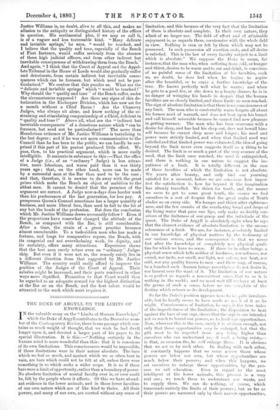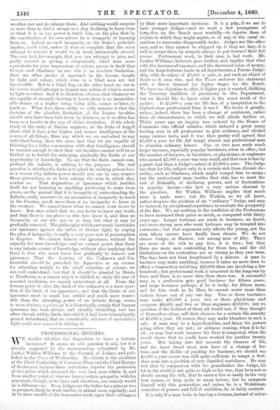THE DUKE OF ARGYLL ON THE LIMITS OF KNOWLEDGE.
IN the valuable essay on the "Limits of Human Knowledge," which the Duke of Argyll contributes to the December num- ber of the Contemporary Review, there is one passage which con- tains so much weight of thought, that we wish he had dwelt longer upon it, and devoted a larger part of his paper to its special illustration. It is this :—" Nothing certainly in the human mind is more wonderful than this : that it is conscious of its own limitations. This consciousness would be impossible, if those limitations were in their nature absolute. The bars which we feel so much, and against which we so often beat in vain, are bars which could not be felt at all, unless there were something in us which seeks a wider scope. It is as if these bars were a limit of opportunity, rather than a boundary of power. No absolute limitation of mental faculty ever is, or ever could be, felt by the people whom it affects. Of this we have abund- ant evidence in the lower animals, and in those lower faculties of our own nature which are of like kind to theirs. AU their powers, and many of our own, are exerted without any sense of limitation, and this because of the very fact that the limitation of them is absolute and complete. in their own nature, they admit of no larger use. The field of effort and of attainable enjoyment is, as regards them, coextensive with the whole field in view. Nothing is seen or felt by them which may not be possessed. In such possession all exertion ends, and all desire is satisfied. This is the law of every faculty subject to a limit which is absolute." We suppose the Duke to mean, for instance, that the man who, when suffering from ,!old, or hunger and thirst, desires to be warm and to eat and drink, is conscious of no painful sense of the limitation of his faculties, such as, no doubt, he does feel when he begins to aspire after the beautiful, or to crave a further knowledge of the true. He knows perfectly well what he wants ; and when he gets to a good fire, or sits down to a hearty dinner, he is in no danger of wringing his hands in despair that the human faculties are so closely limited, and these limits so soon reached. The sign of absolute limitation is that there is no consciousness of any limit. The man who is comfortably warm forgets all about his former need of warmth, and does not beat upon his breast and call himself miserable because he cannot find new pleasure in getting warmer. The man who has been overcome with a desire for sleep, and has had his sleep out, does not bewail him- self because he cannot sleep more and longer; his need and power were strictly limited, and when that limited need was satisfied and that limited power was exhausted, the idea of going beyond the limit never even suggests itself as a thing to be desired. The limit is so much a part of the very essence of the need, that the limit once reached, the need is extinguished, and there is nothing in our nature to suggest the im- patience of a limit. It is totally different in the case of those faculties of which the limitation is not absolute. We yearn after beauty, and only tiud our yearning satisfied for a moment, before we arc conscious how imper- fect the satisfaction is, how far beyond it the imagination
has already travelled. We thirst for truth, and the nearer we seem to get to some great truth, the sooner we find ourselves in a sort of despair that the great realm of Truth eludes us on every side. We hunger and thirst after righteous- ness, and the few crumbs of the everlasting bread and drops of ,
the living water that pass our lips, only make us doubly con- scious of the finiteness of our grasp and the infinitude of the quest. The Duke of Argyll is absolutely right when he says that the clearest evidence of absolute limitation is the uncon- sciousness of a limit. We are, for instance, al.solutely limited in our knowledge of physical matters by the testimony of our various senses, and the consequence is that we never fret after the knowledge of completely new physical quali- ties for which we have no sense. If there be in other beings a physical sense which tells neither of hardness, nor softness, nor sound, nor taste, nor smell, nor light, nor colour, nor heat, nor cold, nor any quality known to men—aud there may, of course, be a hundred such—human beings nevertheless .do not desire it, nor lament over the want of it. The limitation of our nature is so perfect as regards a non-existent sense, that to us it is nothing in the world ; and we must wait till we have at least the germs of such a sense, before we can complain of the destiny which refuses us its development.
So far the Duke's position appears to us to be quite invulner- able, but he hardly seems to have made as mu. Ii of it as he might. Consciousness of limitation, he says, is the true index of the imperfectness of the limitation ; the disposition to beat against the bars of our cage, shows that the cage is one intended not so much to bound our powers, as to limit our opportunities. Now, wherever this is the ease, surely it is avious enough, not only that those opportunities ;nay be enlarged, but that the gift most to be expected from ally being higher than ourselves who can understand us,--if such a being exists,— i5 that, as occasion fits, he will enlarge them. It is obvious that we act so by each other. In dealing with each other, it constantly happens that we come across those whose powers are below our own, but whose opportunities are much below their powers; and when this happens, we set ourselves to enlarge those opportunities, by the pro- cess we call education. Even in regard to the most intelligent of the lower animals, this process is a very real one; we teach them to understand our wants, and to supply them. We can do nothing, of course, which transcends entirely the limits of their powers ; but so far as their powers are narrowed only by their narrow opportunities,
we often can and do enlarge them. And nothing would surprise us more than to find a savage or a dog declining to learn from us what it is in our power to teach him, on the plea that by the constitution of his own nature he is incapable of learning from us. Indeed no such incapacity, as the Duke's principle implies, could exist, unless it were so complete that the mere attempt to remove it would be, in itself, intrinsically absurd. The very fact, for example, that you can attempt to give, and partly succeed in giving, a congenitally blind man some equivalents for your impressions of colour, proves in itself that though such blindness on one side is an absolute limitation, there are other modes of approach to the lessons taught by light and colour, which even to a blind man are not inaccessible. But to a blind dog, on the other hand, no one in his senses would attempt to impart any notion of what is meant by light or colour. And it is, therefore, obvious that whatever we are capable of sincerely desiring to know, there is no inconsider- able chance of a higher being being able, sooner or later, to teach us. What does, then, strike us with surprise is that the doctrine of the absolute limitation of the human faculties should ever have been laid down by thinkers, as it so often has been, as a barrier in the way of divine revelation. If the whole study of the unity of Nature suggests, as the Duke of Argyll shows that it does, a far higher and deeper intelligence at the source of all things, than any which we see embodied in any individual being, then the mere fact that we are capable of thirsting for a fuller communion with that Intelligence, should be warrant enough to show that our faculties cannot well be so limited as to forbid his enlarging gradually the limits of our opportunity of knowledge. To say that the finite cannot com- prehend the infinite, is nothing to the purpose. The real question is whether the finite is to plead its existing prison-bars as a reason why infinite power should not, one by one, remove those prison-bars, or at least enlarge the area to which they confine us. That dogmatism of ignorance which justifies itself for not listening to anything professing to come from above, on the ground that it is incapable of understanding the Infinite, really amounts to an accusation of incapacity to teach in the Creator, much more than of an incapacity to learn in the creature. We cannot know what we cannot even desire to know. But once admit that we can desire to know any truth, and that there is one above us who does know it, and then no incapacity on our side can be so deep but what it may be gradually removed. The philosophy which perversely barricades our ignorance against the influx of diviner light, by urging the plea of incapacity, is really a very poor sort of presumption in disguise. We cannot lament our ignorance, without the capacity for more knowledge; and we cannot assert that there is any infinite source of knowledge, without also implying that there is One who must know how gradually to remove our ignorance. That the doctrine of the Unknown and Un- knowable shoold be preached by Agnostics as an excuse for attending mainly to the small minutiae of science, we can well understand ; but that it should be pleaded by Deists or Pantheists as a reason why it is childish to study the eras of asserted revelation, we cannot understand at all. From the human point of view, the limit of the unknown is a mere ques- tion of the limit of our ignorance ; and that the limits of our ignorance must be much less settled and much more remov- able than the educating power of an infinite Being, seems to us as obvious, a priori, as it is historically certain that human ignorance has been always and steadily dwindling, and has often shrunk within limits into which it had been triumphantly proved beforehand, that no conceivable advance of speculative light could ever succeed in driving it.







































 Previous page
Previous page